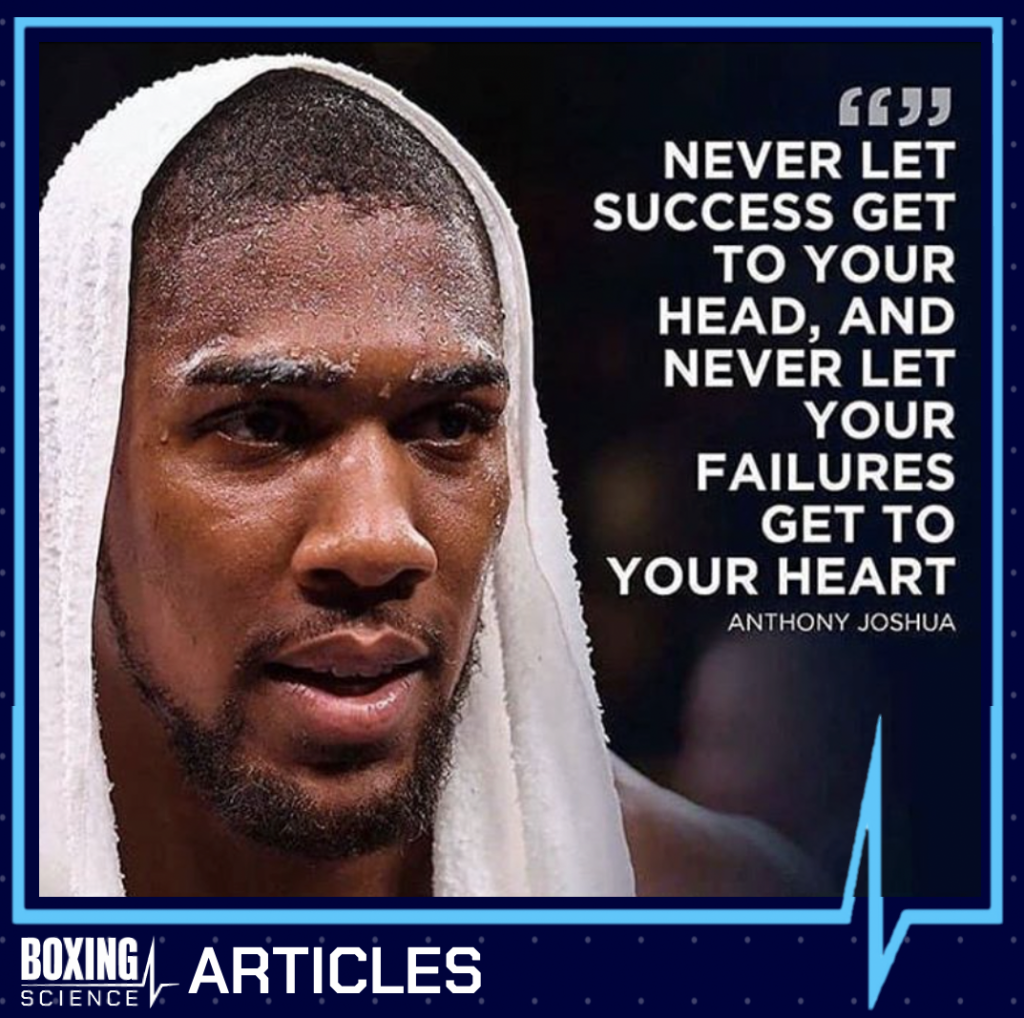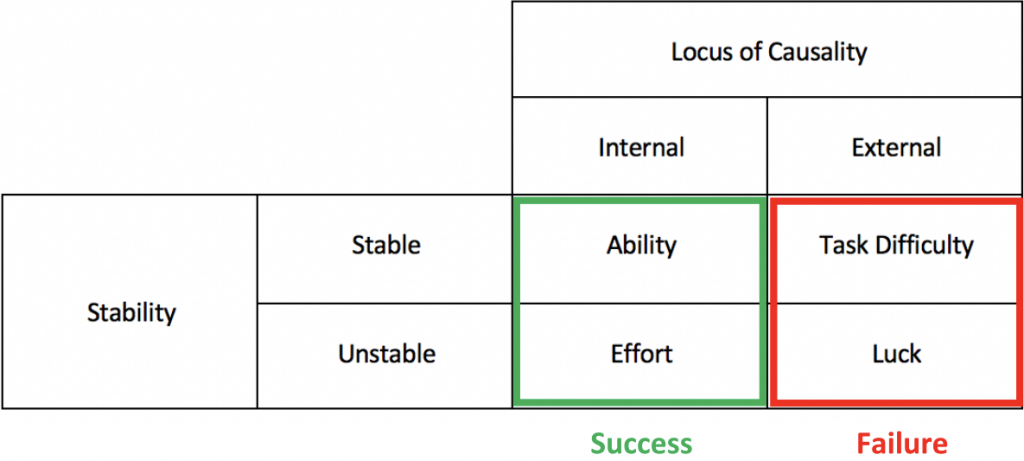Anthony Joshua – How to Comeback From Defeat
How do those at the elite level of the Boxing world keep their egos in check?
How do they maintain their motivation in one of the hardest and most intense sports in the world?
And how can we learn from them in our own preparation for Boxing?
ANTHONY JOSHUA : THE MENTALITY OF A SUPERSTAR
Article by Simon Boonham

In this article we will dissect this quote from Anthony Joshua and try to determine how his mindset allows him to maintain both high levels of performance and sound mental health at the pinnacle of the sport.
Now take a look at this clip from Anthony Joshua’s YouTube channel that was released just a few days after his infamous loss to Andy Ruiz Jr in June 2019.
In this article we will cover the following:
- The quote from AJ.
- How AJ maintains a balanced perspective on winning and losing.
- The psychological mechanisms behind this winner’s mindset.
- How you can develop this mindset for your training too.
THE QUOTE IN CONTEXT
This quote from Anthony Joshua was delivered to his YouTube audience following his first defeat as a professional on June 1st, 2019. But as we hear from Joshua in this video, the lead up to the fight was not without complications…
The fight in Madison Square Garden, New York, was originally scheduled to be against Jarrell Miller – an American heavyweight boxer who could certainly talk the talk.
The two fighters made it through the first half of their training camps with heated words exchanged during their first and only press conference.
But just as the fight seemed to be building some momentum, it was cancelled on account of a failed drug test by Miller.
With the fight having built some excitement off the tensions seen in the conference, as well as the multitude of media outlets that the two men spoke to, uncertainty lingered as to who would take up the challenge against the unified heavyweight champion.
Promoter Eddie Hearn battled through negotiations to see who would take on AJ in New York, with big names like Luis Ortiz being thrown into the mix.
But in the end, an unassuming Mexican heavyweight by the name of Andy Ruiz Jr. stepped up to the plate.
Having recently beaten an opponent of a similar size and stature to Joshua, Ruiz Jr. came into the fight confident in his abilities – proclaiming he was ready to “shock the world” and that all the pressure was on AJ, not him.
It appeared that this ‘nothing-to-lose’ mindset of Ruiz would eventually bring him to knockdown the champion four times in their fight on June 1st, forcing the stoppage in round 7.
For the first time as a professional, Joshua had been defeated.
Joshua remained in New York for a few days, taking time to contemplate the loss, and it was after a few days that he made the video linked above.
Under these new circumstances, Joshua now had to listen to his own words of advice that he had preached for years even before this fight, “Never let success get to your head, and never let failures get to your heart”.
We will now break down what AJ means in this quote in the following section.
MENTALITY OF A SUPERSTAR
“Never let Success Get to Your Head”
What AJ is referring to here is when fighters let their egos get the better of them.
When climbing through the professional ranks as quickly as AJ did, a lot of hype can build around a fighter, so much so that they begin to believe it themselves. Hearing admiration and praise for so long can lead to increases in their self-confidence that would be expected of anyone.
But too much praise can breed complacency.
As fighters buy into their own reputation, their increasing self-confidence can lead to egotistical views of themselves – they might begin to see themselves as unbeatable and above their competition.
This inflation of the ego can be beneficial up to a certain point, as confidence is an absolutely crucial trait for success at any level in boxing. However, over-confidence can sometimes get the better of fighters when it leads them to become complacent in their work.
Whilst a confident mindset is therefore desirable, what AJ is conveying here is that too much confidence in your own abilities as a fighter can lead you to lose your drive and hunger for success.
This mindset therefore breeds behaviours that will cause a fighter to be more likely to fall short due to a lack of adequate preparation or taking their opponent too lightly.
An unassuming fighter like Andy Ruiz, who may not look to be as physically capable as fighters like AJ, Deontay Wilder and Tyson Fury, will be ready to seize the opportunity to surprise that fighter who is taking them lightly.
Which is exactly what he did.
This quote parallels with another saying we have heard from Joshua; “stay hungry, stay humble”. In victory, he believes a fighter must stay hungry and remain driven to achieve his goals. However, as is shown in this next half of the quote, they must also stay humble in defeat…
“Never Let Failure Get To Your Heart”
The second part of his quote conveys the opposite notion; that in defeat, fighters must remain self-assured and confident that they still possess the attributes needed to become victorious once again.
In the phrase, ‘get to your heart’, Joshua alludes to how failure has the potential to knock a fighter’s confidence and damage their motivation to keep training and striving for victory.
This notion of ‘the heart’ relates principally to the fighters’ self-esteem.
When a boxer experiences failure, it can often be in a different context to non-combat sports.
In other athletic pursuits, performers might win by simply being better than their opponents; by being faster, fitter or more skilful. But in combat sports, there is the added objective to inflict damage on the opponent.
Therefore, a boxer might not only have lost because of a lack of skill, incorrect tactics or sub-optimal fitness, but their opponent has overpowered them and inflicted physical damage while doing so.
This can dampen a fighter’s spirit and self-worth, often leading to a reduction in motivation and the drive to perform.
So, whilst a fighter’s ego needs to be checked and managed, it also needs to be fed by enough successful experiences so as to maintain their self-worth and keep them in the game for the long run.
It is this balance of ego and humility that AJ refers to in the video above; as a fighter you must learn to take both your ups and your downs as they come.
HOW DOES THIS MINDSET RELATE TO ELITE ATHLETES?
As we unpack Anthony Joshua’s perspective here, we will draw on the work of an eminent researcher in the field of psychology.
A psychologist named Bernard Weiner developed the Attribution Theory in 1974, which has been widely employed in the field of sports psychology.
Weiner’s Attribution Theory does not simply explain the ‘actual’ causes of behaviours and outcomes, but instead what the individual perceives to be the causes of these outcomes– their attributions.
These attributions can be categorised under two key variables; the locus of causality and stability.
The locus of causality is simply a technical term for the origin of the cause – where the athlete believes the cause of the event came from. This can be either internal (coming from within the athlete themselves) or external (coming from the environment).
The stability of the attribution then simply refers to how likely that cause is to change over time.
As is shown in the model below, unstable factors such as effort and luck can vary more frequently. This might be down to how much effort an athlete is able to exert at various points in the fight and how ‘lucky’ they feel on the day.

Conversely, ability and task difficulty are much more stable. On the day of the competition, the skill level of each athlete is fixed, and so therefore is the difficulty of the competition.
In Boxing, the fighter’s task difficulty is determined by how well their opponent has prepared, as it is that opponent they have to overcome, whereas their own ability is determined by their own preparation.
In combination with the locus of causality, we can see that these attributions can consequently be any combination of internal, external, stable and unstable. Ability and effort are internal because they are regulated by the individual, whereas task difficulty and luck are out of the individual’s control and governed by external factors.
So, now that we have broken down this theory, how does this relate to those high performing athletes like Anthony Joshua?
Successful Athletes And Their Loci of Causality:
Further research into sports performers has revealed trends in how different athletes attribute their successes and failures.
High achievers (i.e. the most successful of elite athletes) tend to attribute their successes internally and their failures externally. In times of success, they emphasise the contributions that they made to their victory, such as the effort they put in and how skilled they are.
In attributing their failure externally, they minimise the importance of their own contributions to the loss and place the emphasis on external factors such as ‘bad luck’ and the difficulty of the task.
The reason for this appears to be that these high achievers can therefore maintain a high self-worth by placing the burden of failure onto the environment, whilst also claiming their successes as their own.
This is because sustaining their self-worth serves to maintain their motivation levels and keep them engaged in training despite experiencing a loss.
Self-worth is also one of the key contributors to a healthy state of mental wellbeing, and if a fighter has a healthy mindset in their general life, then they are more able to thrive in their professional career as a boxer.
Low achievers, on the other hand, do the opposite. They attribute their success externally and failure internally – essentially not taking credit for their own success and being overly self-critical in defeat.
This means that failures can inhibit their self-worth, leading to a lower self-esteem and reducing their levels of motivation.
They will then subsequently be more likely to disengage with training, which will contribute to a lower achievement rate due to inadequate preparation.
Therefore, how we attribute our successes and failures can be one of the primary ways in which our mindset influences our achievements.
How Does AJ Attribute His Successes And Failures?
In the video linked above, it is clear that Anthony Joshua shares the mindset of high achievers in his attributional stance.
When addressing the rumours around his loss to Andy Ruiz Jr, AJ proclaims that despite his best efforts in preparation, sometimes the game plan just simply doesn’t pan out on the night.
This is a prime example of an external attribution of failure, as AJ at least partially attributes his loss to his opponent’s doing. By stating that he was simply the better man on the night, he is offsetting the reason for the failure onto Ruiz and off himself.
Furthermore, he lists a number of issues in the build-up to the fight that were not in his control, such as the change of opponent mid-way through the training camp. These external and unstable factors also likely represented any aspect of ‘luck’ that he believed contributed to his loss to Ruiz.
—
In a much later interview following the fight, AJ uses the phrase “a punch that was sent by the Gods” when referring to the punch that led to his first knockdown from Ruiz.
The quote appears at 21:21 in this interview: https://www.youtube.com/watch?v=G1TSS0XJkEM
Yet again, this is an example of an external attribution. By shifting the burden onto ‘God’ rather than himself or even Ruiz, AJ protects his self-worth and therefore does not damage his self-worth by admitting any fault of his own.
Whilst this could sound as if AJ is not taking responsibility for his actions, it is no doubt a beneficial mindset in the long-term – purely for the purpose of maintaining his motivation.
In the short term, if Joshua were to then slack in his training and fail to prepare adequately for the rematch, then this mindset will have been harmful to his performance.
But by using this external attribution as a reason to train harder and avenge his loss, he could enter the rematch with less pressure in his mind because the loss was ‘not his fault’ and he was always capable of beating Ruiz in the first place.
—
Additionally, in instances of success, Joshua has been known to acknowledge his wins as being down to his own doing, such as his dedication to the sport and the hours of training he puts in to bring him closer to his goals.
Take a look at this video of Joshua in his post-fight press conference after defeating Charles Martin in 2016.
Not only does Joshua utter a variation on his famous quote at 2:02, but at 2:13 he proclaims that his hard work is what led him to the win, and that luck has nothing to do with it.
Comparing AJ’s words across the years and in different contexts is perhaps unfair, but nonetheless shows a pattern similar to those high achievers as outlined earlier…
High achievers attribute their success internally and their failure externally.
Following the defeat to Ruiz, Joshua attributes the punch to luck, but following his win over Martin, he feels that luck has nothing to do with it.
It is this combination of internally attributed successes and externally attributed failures that show AJ has a champion’s mindset, taking his ups and downs as they come and achieving the highest of accolades as he does so.
So, how can we develop this mindset for ourselves?
HOW TO MANAGE YOUR ATTRIBUTIONS LIKE A PRO
Just as we’ve seen in our example with Anthony Joshua, there are two key methods to developing this mindset…

1. Maintain an internal locus of causality for success, to boost your self-confidence
Just as AJ does, in times of success you should look to yourself for reasons as to why you were successful.
Reflect on your preparation and training, what sacrifices did you make? What dedication did you show to help secure yourself the win?
Looking to aspects of the situation, the environment or your opponent will only serve to undermine your own efforts to achieve that success.
Maintaining an internal locus of causality therefore means you should emphasise the characteristics and decisions that were within your control and likely led to your success.
If you sacrificed time with your loved ones, friends and family in order to prepare – then that is a reason you should credit for helping you succeed.
When you had to dig deep and go that extra mile to put yourself in the best condition possible on the night, you were increasing your chances of winning – and seeing the rewards from your hard work will serve as a mechanism to further increase your motivation in the future.
In the long-term, therefore, acknowledging your own contributions to your success will increase your self-confidence for future bouts.
2. In failure, keep an external locus of causality to maintain self-worth
Emphasising the role of external factors (such as your opponent, the environment or the judges’ impact) might seem like ‘passing the blame’ at first, but it will be a more beneficial mindset to hold for the long-term.
This is due to the fundamental link between an external locus of causality in defeat and maintaining self-confidence for future performances.
As we have discussed earlier, maintaining your self-worth is crucial for your whole wellbeing as an individual, because a higher self-worth corresponds to a higher self-esteem.
Your higher self-esteem as an individual is going to lead to a more optimal level of self-confidence as a boxer, and that higher self-confidence will ultimately translate into better performances in the future.
Therefore, in defeat you should attempt to acknowledge all the factors in the environment and the wider setting that contributed to that defeat in an attempt not to devalue your own attributes.
This might take the form of recognising the qualities of your opponent and perhaps holding the view that ‘they were better on the night’ – which is not to be confused with ‘they were a better fighter than me’.
This distinction is important.
The first example is an external attribution, whereas the latter still places the burden of inability or lack of skill on yourself, potentially reducing your self-confidence in your abilities.
This subtle difference is the hardest part in staying humble in defeat; you have to recognise your opponent’s strengths, but not so much as to degrade your own skillset in the process.
-
 Boxing Science Elite Pack£140.00
Boxing Science Elite Pack£140.00
Once you have fostered this mindset, you must maintain it.
That means reflecting on all your performances, good and bad. Try to understand what you did well and what else contributed to the outcome, managing your attributions as you do so.
This is the balance that Anthony Joshua is referring to, the mentality of a champion.
Take-Away Messages:
To conclude, in this article we have discussed:
- A key quote from Anthony Joshua
- AJ’s mindset with regards to winning and losing
- How AJ shows the mentality of a winner
- How you can foster this mindset in your own preparation


